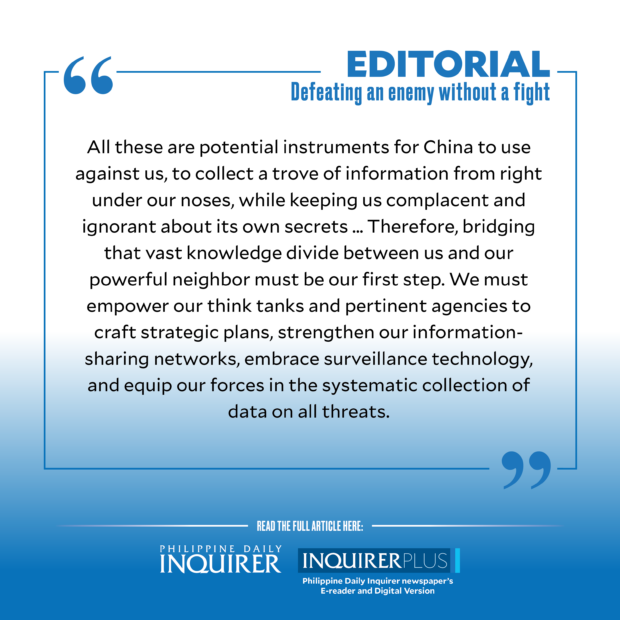“Let China sleep, for when she wakes, she will shake the world.” – Napoleon Bonaparte
While the authenticity of this quote is contested, China’s undeniable power has become a cause for concern for neighboring countries like the Philippines. China’s increasing military strength in disputed regions and its aggressive behavior in the West Philippine Sea have raised alarms. However, the danger posed by China extends beyond territorial disputes. There is a growing fear of covert actions within Philippines’ own shores, including the presence of Chinese spies or sleeper agents and even traitorous citizens.
In August, Jonathan Malaya from the National Security Council warned about China’s use of “political operators” engaged in “cognitive warfare” in the Philippines to manipulate public opinion. The Inquirer reported instances where critics of China were approached with offers of money to write negatively about Vietnam’s militarization in the South China Sea, potentially straining relations between Manila and Hanoi.
Similar allegations have been made against China in other parts of the world, such as spying accusations against a UK parliament researcher, a public inquiry in Canada on election meddling by China and Russia, and the arrest of two US Navy sailors for leaking military secrets to China. While all countries engage in propaganda and espionage to some degree, the level of Chinese interference in the Philippines’ affairs is concerning.
Defense Secretary Gilbert “Gibo” Teodoro Jr. has expressed concerns over China’s “covert economic and information activities” aimed at undermining Manila’s position. He emphasized that the unseen actions are what truly worry them. As Sun Tzu wrote in “The Art of War,” the best strategy is to break the enemy’s resistance without fighting. China may be employing such tactics against the Philippines, leaving the country in a vulnerable position.
Instances of potential Chinese influence in critical sectors within the Philippines have added to the concerns. The State Grid Corp. of China’s stake in the National Grid Corp. of the Philippines raises questions about China’s remote access to the national power transmission system. There are also concerns about Chinese-built cell towers in military camps, potentially compromising national security. The increasing number of Chinese workers, particularly in Philippine offshore gaming operators and infrastructure projects, also raises suspicions.
To prevent succumbing to adversaries’ strategies, it is crucial to bridge the knowledge gap between the Philippines and China. Strategic plans need to be developed, information sharing networks strengthened, surveillance technology embraced, and forces equipped to collect data on threats systematically. Prioritizing intelligence and confidentiality in allocating resources is imperative.
Subscribe to INQUIRER PLUS for access to The Philippine Daily Inquirer and over 70+ titles, share up to 5 gadgets, listen to the news, download articles as early as 4am, and share on social media. Call 8966000 for more information.
Denial of responsibility! Vigour Times is an automatic aggregator of Global media. In each content, the hyperlink to the primary source is specified. All trademarks belong to their rightful owners, and all materials to their authors. For any complaint, please reach us at – [email protected]. We will take necessary action within 24 hours.


